How Taxibox king Ben Cohn overcame his anxiety to go global
Taxibox co-founder Ben Cohn’s self storage company is conquering the world but he’s also had to contend with crippling panic attacks and the near collapse of his dreams.
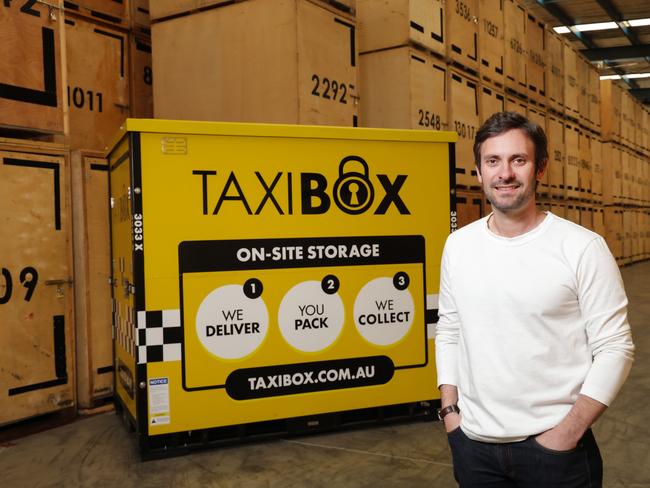
As the Covid-19 pandemic was closing in, one night Ben Cohn’s world turned pitch black.
It was early 2020, and the young entrepreneur had just bought a warehouse and put through a 10 per cent deposit with a personal guarantee for his mobile self-storage business called Taxibox, known for its iconic bright yellow storage units.
His co-founder, Jeremy Rosen, had stepped aside from the business after Cohn had bought him out. Bookings had collapsed overnight and Cohn had been forced to cut his staff back to two or three days a week of work.
Sitting in silence in his old Edwardian house in the leafy Melbourne suburb of Ripponlea that he and wife Noga had purchased two years earlier in happier times, he heard the cries of his one-year-old son from his bedroom.
“So I went into his room. It was just the two of us,” Cohn now recalls.
“I was sitting there rocking my son to sleep and it was pitch black. Suddenly I had this overwhelming feeling of ‘How is it that I am in this position?’
“After having been pretty successful, I felt like I was sitting on a sinking ship on my own and wondering how I was going to get out of it.
“After having run the business for nine years, my personality and identity was wound up in it. So there was this feeling of fear of failure that was quite scary.”
It was his wife, with four grandparents who are Holocaust survivors, who reassured him. She told him that even if they lost everything, it would make no difference.
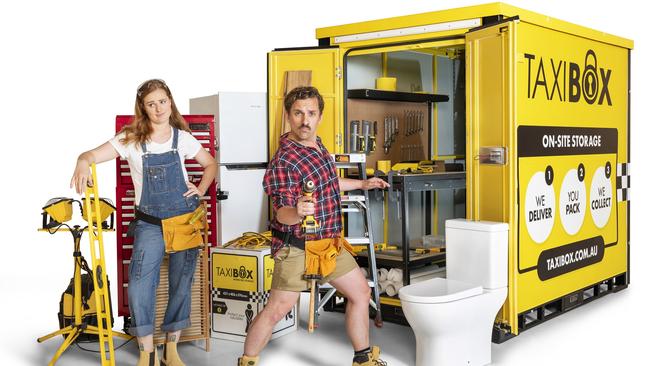
A few months later, Cohn was invited to present to a young leaders’ forum where he retold the story of his wife’s unwavering support. And wept uncontrollably.
“Someone asked me the question that day, ‘How is Noga handling all of this?’ I just burst into tears. Because she was just willing to give me anything, she was just willing to be there by my side,” he recalls before a pause when; for a brief moment, a tear returns.
History now shows that while Taxibox almost collapsed during Covid-19 as a result of one ill-fated property deal, it not only survived when the bank came through with the money but it has since thrived.
Thirteen years since the business was founded, it is now one of the top five most recognised storage brands in Australia, and used by hundreds of thousands of Australians to store their valuables and move house.
Taxibox has also just been launched into international relocations to and from North America through a partnership with $10bn storage giant UHaul America.
The moving market between the US and Australia is the fourth largest in the world and the relationship lets Taxibox deliver UHaul’s mobile storage service, U-Boxes, in Australia, and its partner does vice versa in America for a fixed price per Taxibox, that can be booked online.
The partnership came about after Cohn cold-called Joe Shoen, the legendary chairman of UHaul America.
After the call and a discussion with Shoen’s son, Sam, Cohn flew to the UHaul headquarters in Phoenix, Arizona, in April this year and the alliance was sealed.
“They were the most humble, hardworking people. I spent the day with them and their team and they’ve been amazing to deal with,” Cohn says.
“We’ve now got this incredible, first-of-a-kind relationship for door-to-door international moving services swapping U-boxes and Taxiboxes. It is a game changer.”
But perhaps the greatest achievement in recent times for the Melbourne-based Cohn, a former Accenture consultant, has been containing the crippling anxiety which first surfaced when he was a teenager.
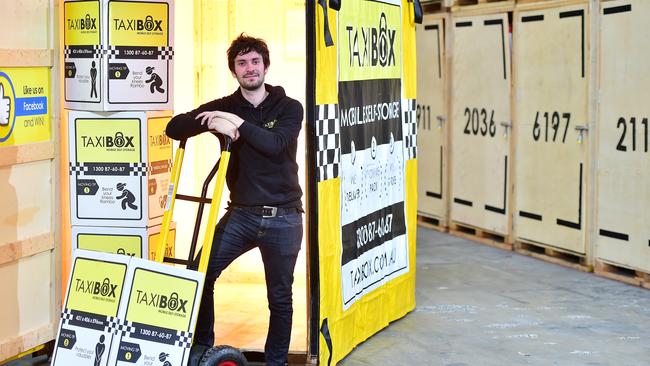
At the age of 15, he went to visit his brother in the UK when he was stricken after landing at the airport.
He phoned his father, who was back in Australia, confused and bewildered.
“I told him ‘I don’t know what’s going on, I’m in this downward spiral and I can’t get out of it,” Cohn says.
“That was the first time that my dad told me he had experienced similar attacks over the previous 15 years. It was the first time he ever acknowledged it. He’d actually dealt with panic.
“He said to me, ‘Ben, if you want to get on a flight right now, and I’ll come and be there with you if that’s something you want’.”
Cohn got through the episode.
But the anxiety returned once he started Taxibox amid the pressure that comes with being a business owner, especially having to stand up in front of staff who expect to see a bulletproof leader.
“I vividly remember one day standing up in front of my team and making an announcement when suddenly I was short of breath and felt like I was going to faint,” he says.
“So I actually said to them, ‘I’m having a panic attack’. I acknowledged it and sat down. I had put so much pressure on myself, but to go through that and acknowledge it was actually sobering.”
It proved to be a turning point and Cohn has since learned to contain his anxiety.
He’s been offered medication. But, proudly, not once has he taken a pill.
Toughened by conflict
Cohn’s grandparents fled Germany during World War II to settle in South Africa, where their children and three grandsons were born. Cohn was the youngest.
Cohn’s parents, Michael and Gill, moved to Israel in 1987 when he was just three years old to settle in an affluent town on the border of the West Bank called Kokhav Yair.
“I grew up in a narrative where the Jewish culture was strong in the story telling of my family’s history. My dad did a great job in building that narrative,” he says.
“The narrative of that struggle was a real motivator for my personality and motivation. I never met my grandfather or grandmother, so it almost glorified the narrative.”
Cohn and his family were in Israel during the first Gulf War in 1990 where the challenging daily life, including stints in bunkers, taught him resilience and gave him the motivation and work ethic that would serve him well in his entrepreneurial journey.
He remembers sealing the doors of bunkers with tape to stop any gas from chemical or biological weapons seeping through.
“As kids we were excited by the gas masks we were wearing. I still remember the smell of the plastic when we got distributed with the suits with the gas masks,” he says.
The turning point for their life in Israel came in November 1995 with the assassination of then prime minister Yitzhak Rabin.
The family emigrated to Australia, settling in the Sydney beachside suburb of Bondi. From the age of 13 Cohn attended Vaucluse High School.
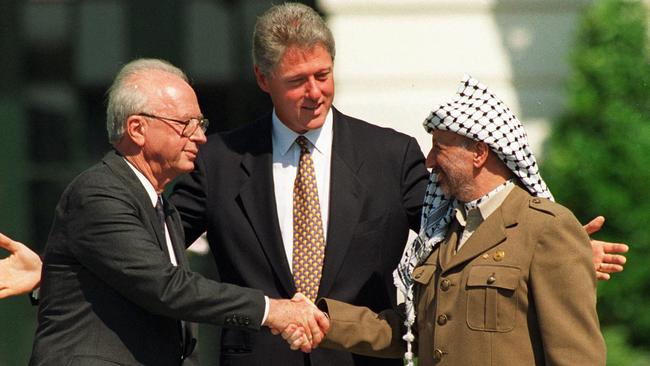
Within a couple of years he started his first venture, importing squash racquets from the US to sell on eBay in Australia, before graduating and doing a commerce degree at the University of Sydney, majoring in finance.
Cohn then spent two years as a management consultant with Accenture where he met Jeremy Rosen, before in 2008 spending a year renovating a property in Bondi and in 2009 travelling around the world for 12 months.
In early 2010 he started his second business venture, importing flooring from China.
He initially conceived it to help his parents with a housing renovation and save them tens of thousands of dollars on their flooring.
But after spending two months backpacking around China to find a factory that could make engineered oak flooring, he knew he could build an importing business. He called it Cohncorp.
“I found a factory that could make 260mm-wide boards of 21mm thickness with an engineered oak floor on top, with the right humidity and moisture content for the Australian climate,” he says.
He even flew his father to the factory once to convince him it was real.
But his connections with the Chinese factory would also help launch Taxibox in August that year after Cohn had earlier became enamoured with a similar mobile story concept while working for Accenture in New York.
He and Rosen recognised a unique opportunity to set up their own brand in Australia and disrupt the local self-storage market. So Cohn asked the Chinese factories that made his wooden floors to make him wooden crates. They duly obliged.
Rosen left his job, then at Grant Samuel, to help start Taxibox.
“So the first batch of 100 taxi boxes were actually made from the same structural plywood you would use for floors,” Cohn says.
Today, of the 10,000 Taxiboxes in the market, the majority are still made of plywood, although the design and structure has been vastly improved over the years.
“It is actually the perfect product for storage because it breathes properly. Whereas a lot of the metals sheds can cause condensation and mildew,” he says.
The post-Covid recovery
Under Cohn’s leadership Taxibox has now bounced back from the turmoil of Covid-19,
achieving 100 per cent revenue growth in the past two years. He retains his friendship with Rosen, despite the latter’s departure from the business.
The firm has attracted external investment from a group of high net worth individuals to help acquire its own storage sites, including several for redevelopment in the future.
The property acquisition strategy in the past three years has accelerated earnings and the firm now has 11 facilities, four of which it owns. The ambition is to eventually own them all, which could require external capital.
Growing the core Taxibox mobile storage business nationally will continue to be internally funded.
It has a national team of 75 people, of which eight are in the senior leadership team, and over the past six months has set up operations in Adelaide and Perth. New Zealand is next.
It is now trialling a self-service product called Taxibox Fetch, where customers can transport their own Taxiboxes rather than having them delivered.
Cohn is also the co-founder of Calcumate, a proprietary online storage calculator initially developed for Taxibox that has since become a storage calculator available to self-storage and moving providers worldwide.
“This is a system where a customer can find out how many Taxiboxes they need and is a game changer in terms of the experience,” he says.
The Cohn family now has two young children following the birth of a daughter 18 months ago, all while they were renovating their Ripponlea home.
The project is two years behind schedule and they have gone through two building and architectural firms, while moving out of the house twice.
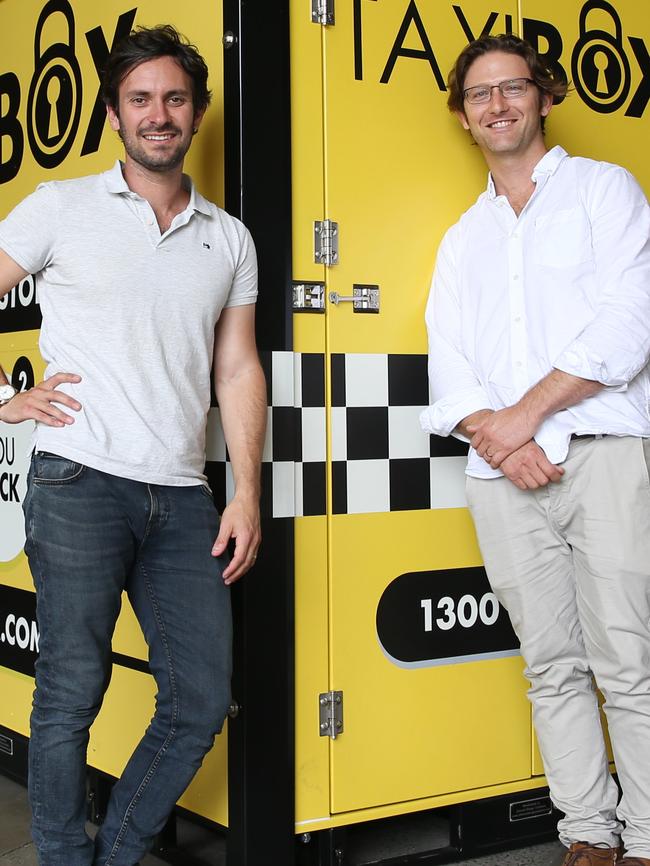
But given their history and experiences with Taxibox, Cohn and his wife are optimists.
“Building and renovations, everyone says it’s like the worst experience. But I went into this really positively. It hasn’t been the worst experience,” he says.
“If you asked me ‘Would I do this again’, at the drop of a hat I would do it again. Because I just think life’s too short.”
“Even when the builder went under, I thought ‘Have I dealt with someone who has gone under before?’ No. So let’s see what happens now. It will be a valuable lesson for the future’.”
In his business life, Cohn believes rising industrial and commercial land prices will continue to put pressure on traditional storage pricing, allowing Taxibox to continue to thrive as a disrupter in the industry.
He also thinks the increasing densification of cities and suburbs resulting in traffic congestion will mean consumers are less likely to drive for hours to get to and from storage facilities. Instead they will want them delivered to, and picked up from, their front door.
“We are the fourth most recognised storage company in the country and we’ve been running for just 13 years,” he says.
“Our Taxiboxes are all over the place now and we have blue skies ahead. To see that growth is amazing for me.”






To join the conversation, please log in. Don't have an account? Register
Join the conversation, you are commenting as Logout